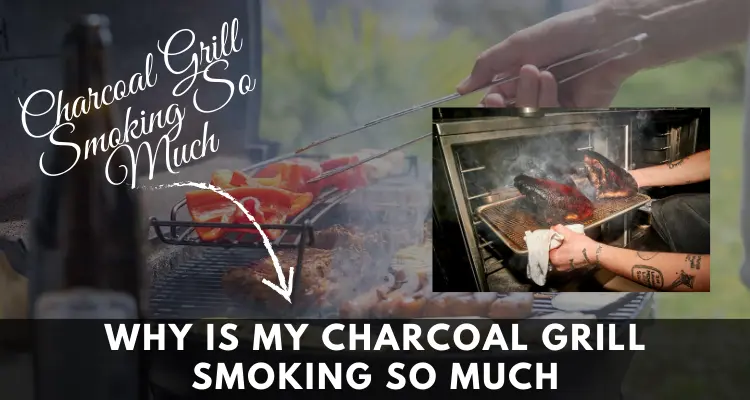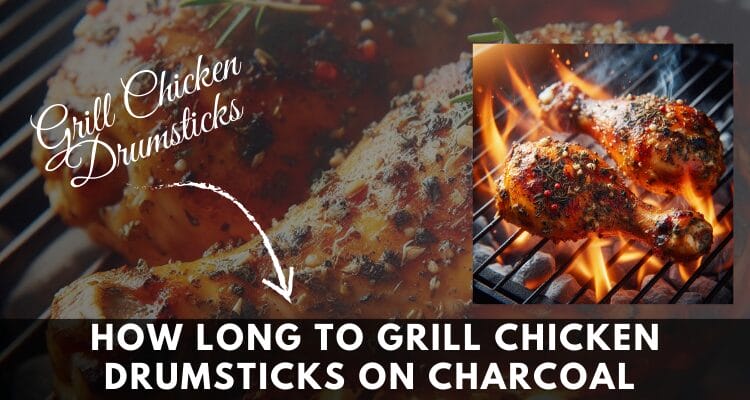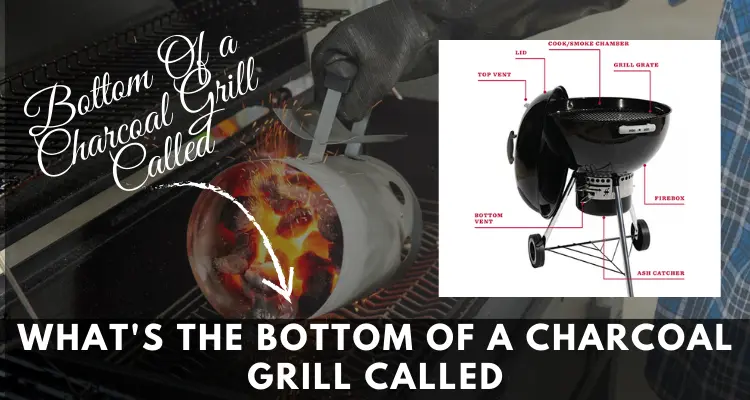Why Is My Charcoal Grill Smoking So Much
you’re all set to host the perfect backyard barbecue, but instead of sizzling steaks and juicy burgers, your charcoal grill is billowing smoke like a chimney.
If your charcoal grill is smoking excessively, it might be due to insufficient airflow, damp charcoal, or excess grease. Ensure vents are open and charcoal is dry for optimal performance.
What gives? In today’s blog post, we’re diving into the reasons why your charcoal grill might be smoking so much and what you can jasperdo to fix it.
Get ready to banish that pesky smoke and get back to grilling up a storm!
Understanding the Smoking Process
Smoking is a popular cooking technique that has been used for centuries to give food a unique and delicious flavor.
It involves slow-cooking food over indirect heat in the presence of wood smoke. This method is commonly used for meats, but can also be applied to vegetables, fruits, and even cheese.
There are two main components involved in the smoking process: the heat source and the wood chips or chunks that provide the smoke. In charcoal grilling, charcoal briquettes or lump charcoal serve as the heat source while wood chips are added to produce smoke.
The first step in understanding why your charcoal grill is smoking so much is to familiarize yourself with its components and how they work together.
The amount of smoke produced by your grill depends on several factors such as the type of wood being used, its moisture level, and how it is positioned on top of the hot coals.
When using a charcoal grill for smoking, it’s important to remember that you’re not trying to cook food quickly at high temperatures like you would with direct grilling.
Instead, you want to maintain a low and steady temperature inside your grill (usually between 225-275°F) for an extended period. This allows enough time for the meat to absorb all the smoky goodness.
Reasons for Excessive Smoke
Excessive smoke from a charcoal grill is not only frustrating but can also be harmful to our health. The thick plumes of smoke can make it difficult to cook and enjoy a meal outdoors, leaving us wondering what could be causing this issue.
In this section, we will discuss the main reasons for excessive smoke from a charcoal grill.
1. Low-Quality Charcoal
One of the most common reasons for excessive smoke from a charcoal grill is using low-quality or damp charcoal.
Poor-quality coals contain more impurities, which can create excess smoke when burned. Damp coals, on the other hand, produce thick white smoke due to incomplete combustion of water and trapped gases within the briquettes.
To avoid this issue, always opt for high-quality lump or hardwood charcoal that burns cleaner with less smoke.
2. Grease Buildup
Over time, grease and food particles accumulate on your grill’s grates and interior surfaces, leading to excessive smoke during cooking.
As grease drips onto hot coals, it vaporizes quickly and produces heavy amounts of thick white smoke that can engulf your food.
Regularly cleaning your grill with a wire brush or scraper will prevent grease buildup and ensure proper airflow for even cooking.
3. Airflow Issues
Adequate airflow is crucial for maintaining consistent heat levels in your grill and preventing excessive smoking.
If there is not enough oxygen supply in the firebox, it will lead to smoldering instead of clean burning and result in more visible smoke production.
Make sure to keep all vents open while cooking and avoid overcrowding your grill with too much food.
4. Incorrect Fuel Placement
Another possible reason for excessive smoke from a charcoal grill is incorrect fuel placement on the fire grate.
When stacking briquettes too close together or piling them too high, they may smother each other’s flames and create dense clouds of black or grayish-white smoke instead of clean-burning embers.
Ensuring proper fuel placement by following the manufacturer’s guidelines will help reduce smoke output.
5. Windy Conditions
Cooking in windy conditions can also contribute to excessive smoke from a charcoal grill.
Strong winds can blow ash and sparks around, causing them to stick to the food and create a sooty layer on the surface.
To avoid this issue, try to position your grill in a sheltered area or use a windbreak if possible.
Type of charcoal used
When it comes to charcoal grilling, the type of charcoal used can play a significant role in the amount of smoke produced. There are two main types of charcoal: lump and briquette.
Lump charcoal is made from pieces of hardwood that have been burned down to a carbonized state.
It is known for its natural and smoky flavor, making it popular among barbecue enthusiasts. However, because it is not compressed like briquettes, lump charcoal can produce more smoke and burn hotter and faster.
This means that if you are using lump charcoal in your grill, you may notice more smoke than usual.
On the other hand, briquettes are made by compressing sawdust and other wood scraps with additives such as starch or sodium nitrate.
They tend to burn more slowly and evenly compared to lump charcoal but may not produce as much smoke or flavorful results. This makes them a popular choice for beginners or those who want a consistent cooking experience.
In addition to these two main types of charcoal, there are also flavored charcoals available on the market.
These include mesquite, hickory, applewood, and cherrywood charcoals which add an extra layer of flavor to your grilled food. However, these flavored charcoals can also contribute to an increase in smoke production.
Amount of charcoal used
One of the most common concerns when using a charcoal grill is excessive smoke production.
Not only can this be unpleasant for those enjoying a BBQ, but it can also be a sign of improper use or maintenance of the grill.
One factor that may contribute to excessive smoking is the amount of charcoal being used.
To understand why the amount of charcoal used affects smoking, it’s important to first understand how charcoal grills work.
Charcoal grills rely on the combustion of charcoal to create heat and cook food. When lit, the coals undergo a process called pyrolysis, which releases gases and volatile compounds that ignite and produce heat.
The remaining solid carbon burns slowly as embers, providing sustained heat for cooking.
Airflow control
Airflow control plays a crucial role in determining the amount of smoke produced by your charcoal grill.
It refers to the regulation of oxygen flow to the charcoal, which in turn affects the intensity and duration of the fire.
Ignoring proper airflow control can result in excessive smoking, making it difficult to cook food properly and leaving an unpleasant taste.
The most common reason for too much smoke from a charcoal grill is an insufficient supply of oxygen.
When there is not enough air flowing into the grill, the coals will not burn efficiently, resulting in thick clouds of smoke.
This can happen if you have closed off all vents or placed a lid on top of the grill, restricting airflow.
To avoid this issue, always keep at least one vent open and maintain proper ventilation throughout the cooking process.
Damp or wet charcoal
One of the common issues that grillers may encounter when using a charcoal grill is excessive smoke.
While some amount of smoke is expected when grilling with charcoal, if you notice an abnormal amount of smoke, it could be a sign of damp or wet charcoal.
Damp or wet charcoal can be caused by a variety of factors such as rain, humidity, improper storage, or even accidentally leaving your bag of charcoal out in the open.
When this happens, the moisture from these external sources can seep into the charcoal briquettes and make them damp or wet.
Grease buildup
Grease buildup is a common issue that can lead to excessive smoke in your charcoal grill.
This buildup occurs when the fat and oil from food drips onto the charcoal, causing it to flare up and create thick smoke.
It not only affects the taste of your food but also poses a potential fire hazard if left unaddressed.
There are several reasons why grease buildup can occur in your grill. One of the main causes is not properly cleaning your grill after each use. If you leave leftover residue and grease on the grates, it will continue to accumulate over time and eventually cause excessive smoke.
To avoid these issues and reduce excessive smoking on your charcoal grill due to grease accumulation, here are some tips:
1) Clean your grill after each use: As mentioned earlier, this is crucial in preventing any future buildups from occurring. Use warm soapy water and a grill brush to thoroughly clean the grates, and don’t forget to also clean the inside of the grill.
2) Use leaner cuts of meat: Choosing leaner meats will reduce the amount of grease produced, resulting in less smoke and a healthier meal.
3) Control oil usage: When marinating or basting your food, try to use as little oil as possible. This will minimize dripping and flare-ups on the coals.
Troubleshooting Tips to Reduce Smoke
Smoke is a common occurrence when using a charcoal grill, but excessive smoke can be frustrating and even dangerous.
Not only can it impact the flavor of your food, but it can also cause health concerns and fire hazards.
If you find yourself wondering why your charcoal grill is smoking so much, here are some troubleshooting tips to help reduce the amount of smoke.
1. Clean Your Grill Regularly
One of the most common reasons for excess smoke on a charcoal grill is built-up residue and grease.
This buildup can result in uneven heat distribution and flare-ups, leading to more smoke. To prevent this issue, make sure to clean your grill regularly after each use.
Use a wire brush to remove any debris or stuck-on residue from the grates and wipe down the inside of the grill with warm, soapy water.
2. Control Airflow
The airflow in your grill plays a significant role in how much smoke it produces. If there is not enough airflow, it can cause smoldering coals which produce more smoke than necessary.
On the other hand, too much air can also lead to excessive smoke due to increased oxygen levels feeding the fire.
It’s essential to find the right balance by adjusting the vents on your grill according to your specific needs.
3. Use Quality Charcoal
The type of charcoal you use can also affect how much smoke your grill produces.
Low-quality briquettes tend to contain additives that contribute to excess smoke production while lump charcoal made from natural wood has fewer additives resulting in less smoke output.
4. Preheat Your Grill Before Cooking
Preheating your grill before cooking helps burn off any residual chemicals or moisture that may be present on new or previously used coals.
This step will also ensure even heat distribution throughout your grilling session and help minimize excess smoke.
5. Use Wood Chips or Pellets for Flavoring
Adding wood chips or pellets soaked in water before placing them over hot coals can add a smoky flavor to your food without producing too much smoke.
These chips or pellets should be added sparingly as they can quickly become overpowering if used in excess.
Adjusting airflow
Adjusting airflow is a crucial factor in controlling the amount of smoke produced by your charcoal grill.
Too much smoke can lead to an overpowering smoky flavor in your food, while too little smoke can result in a lack of flavor.
Understanding how to adjust and regulate the airflow in your charcoal grill is essential for achieving perfectly smoked dishes.
There are two main ways to adjust the airflow on a charcoal grill: through the vents and through the lid. The vents, located at the bottom and top of the grill, control the amount of oxygen that enters and circulates within the cooking chamber. Oxygen is necessary for combustion to occur, which is what produces heat and smoke.
To start with, ensure that all vents are open before lighting your charcoal grill. This allows enough oxygen into the coals to ignite them properly. Once lit, you can begin adjusting the vents according to your desired level of smoke production.
If you notice excessive amounts of thick white or black smoke coming from your grill, it could be an indication that there is not enough oxygen reaching the coals. In this case, try opening up all vents fully until you see clear blue smoke coming out from under the lid.
On the other hand, if you want more intense smoky flavors in your food, partially close off some of the vents using either a damper or sliding cover. This will restrict oxygen flow into the cooking chamber and allow more time for wood chips or chunks to smolder and produce flavorful smoke.
Another effective way to control airflow on a charcoal grill is through adjusting the lid position. By propping open one side of
Advanced Techniques for Controlling Smoke
There are a few advanced techniques that you can try to help control the amount of smoke coming from your charcoal grill.
These methods may take some practice and experimentation, but they can greatly improve your grilling experience.
1. Use Lump Charcoal
One way to reduce smoke is by using lump charcoal instead of briquettes. Briquettes contain additives such as coal dust and starch binders, which can contribute to excess smoke production. Lump charcoal, on the other hand, is made from 100% natural wood and produces less ash and smoke.
2. Control Airflow
The amount of oxygen reaching the coals directly affects how much smoke they produce. To reduce smoke, adjust the vents on your grill to regulate airflow.
Opening them wide will allow more oxygen in, resulting in hotter and faster burning coals with less smoke. On the other hand, closing the vents will restrict airflow and result in slower but cooler burning coals with more smoke.
3. Minimize Grease Drippings
Excessive grease dripping onto hot coals can also cause excessive smoking. To avoid this issue, use a drip pan under your food or place aluminum foil on top of the coals before grilling.
4. Preheat Your Grill
A properly preheated grill can also help reduce smoke production. Allow your grill to heat up for at least 15 minutes before adding any food to it. This will ensure that your coals are fully lit and ready for cooking.
5 . Use Wood Chips or Chunks
Another way to add flavor without creating too much smoke is by using wood chips or chunks instead of soaking them in water first before adding them on top of hot coals or placing them in a smoker box above the fire source.
6 . Try Different Smoking Woods:
Different types of wood produce varying levels of smokiness when burned; experimenting with different woods like mesquite, hickory, cherry, or apple can help you find the one that suits your taste.
7 . Use a Water Pan:
Placing a water pan in your grill acts as a heat sink and helps regulate the temperature inside. It also adds moisture to the air, reducing smoke production.
Conclusion
In conclusion, if your charcoal grill is smoking too much, there are several steps you can take to reduce the smoke. From properly cleaning and maintaining your grill to controlling the airflow and using different types of charcoal, these tips can help you enjoy a smoke-free grilling experience. Remember to always practice safety measures when working with fire, and have fun experimenting with different techniques to find what works best for you. With these tips in mind, you can say goodbye to excessive smoke and hello to deliciously grilled meals every time!






